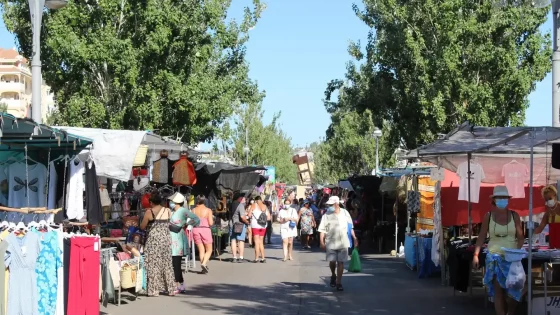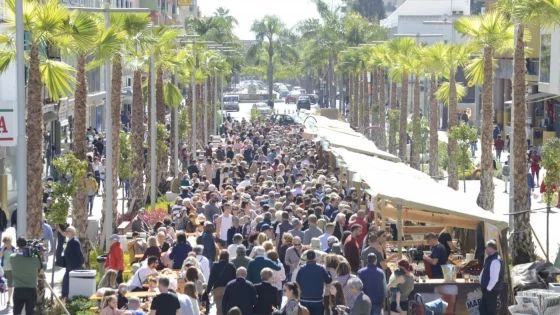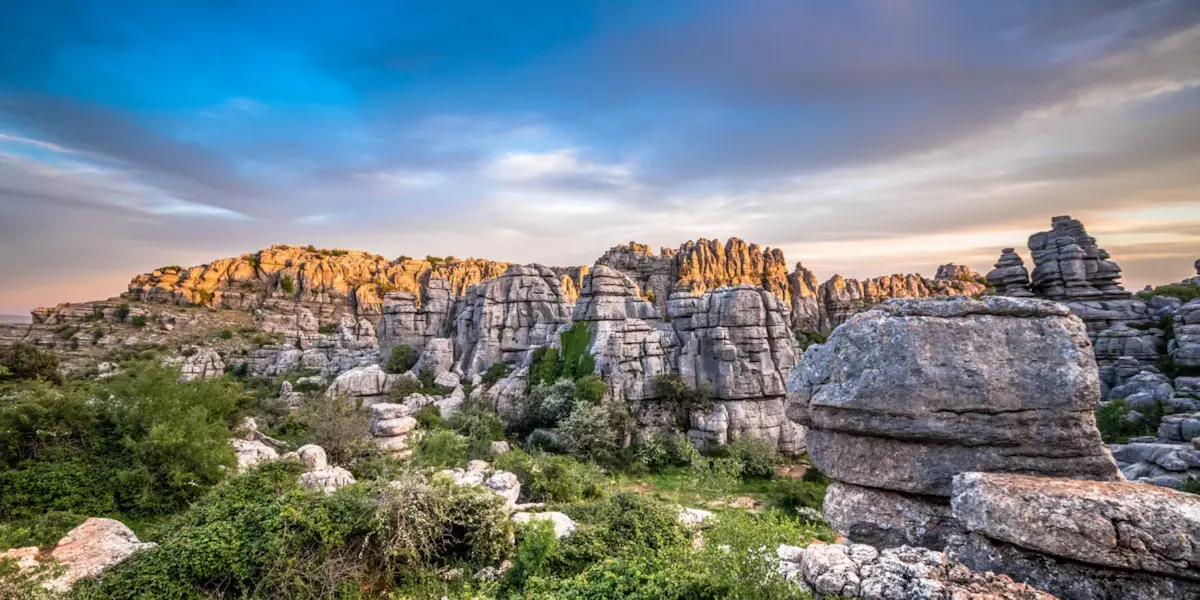
Torcal de Antequera is an extraordinary natural landscape located in the province of Málaga. With its landscapes of unique rock formations and rich biodiversity, Torcal is a must-visit destination for nature enthusiasts and adventure seekers.
If you’re planning to visit Torcal de Antequera, an excellent option is to hire a car at Malaga Airport. This will allow you to enjoy the freedom and flexibility to explore the region at your own pace. You’ll discover Torcal’s karst formations, which have been sculpted over millions of years by erosion.
Take a stroll along the marked trails of this natural paradise and be amazed by the uniqueness of its rocks, some of which take on shapes that defy imagination.
Table of Contents
Guide to Visiting the Torcal de Antequera Natural Area
Torcal de Antequera is a destination that hosts trails and routes that will take you through breathtaking landscapes and astonishing rock formations. Each step will lead you to new discoveries, from viewpoints with spectacular views to fascinating geological formations shaped by millions of years of erosion.
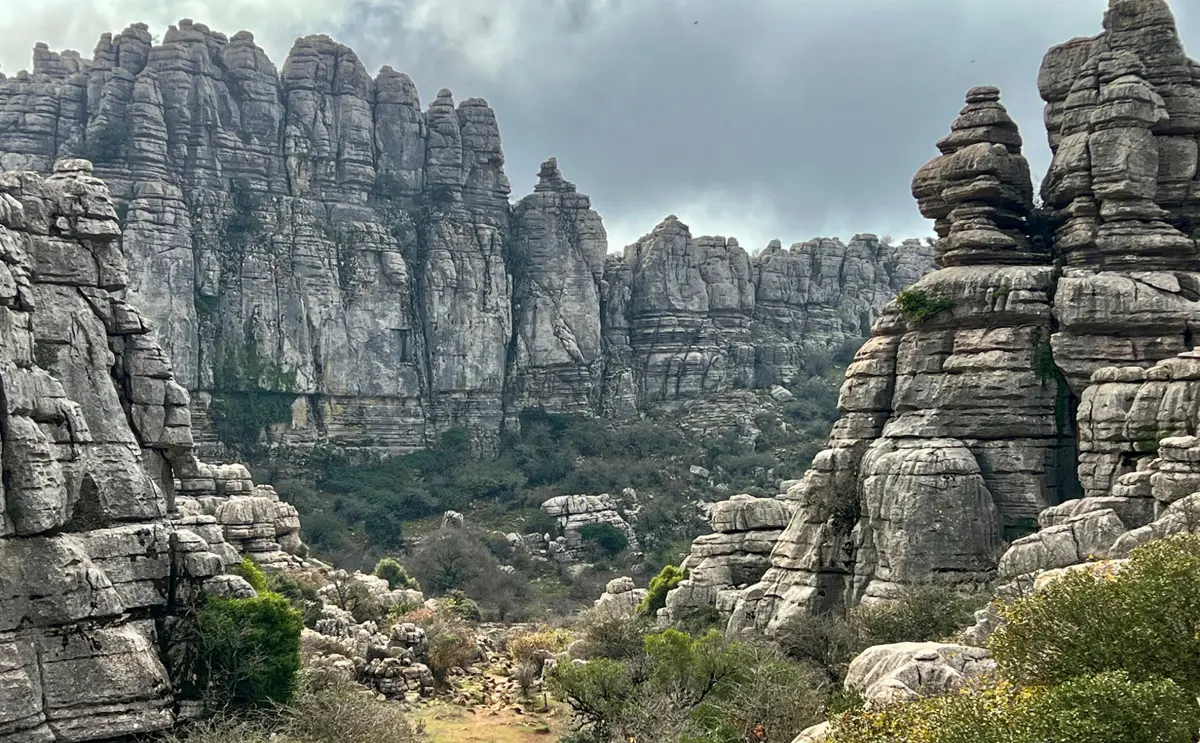
What to See in Torcal de Antequera
The Torcal de Antequera Natural Area is known for its karst landscapes. Here are some of the places you can’t miss in this natural area, including where to eat or get more information.
Visitor Center
The Torcal de Antequera Visitor Center is an ideal place to request information about the natural area and its geological formation. There you’ll find interactive exhibitions, informative panels, and qualified staff who will provide you with interesting details about the history, geology, and biodiversity of Torcal.
Torcal Alto Restaurant
The restaurant at Torcal de Antequera has a magnificent terrace that offers an authentic culinary experience in an environment characterized by its unique landscape. The place offers both traditional dishes such as migas, porra antequerana, plato torcaleño, or Bienmesabe, as well as vegetarian, vegan, and children’s options.
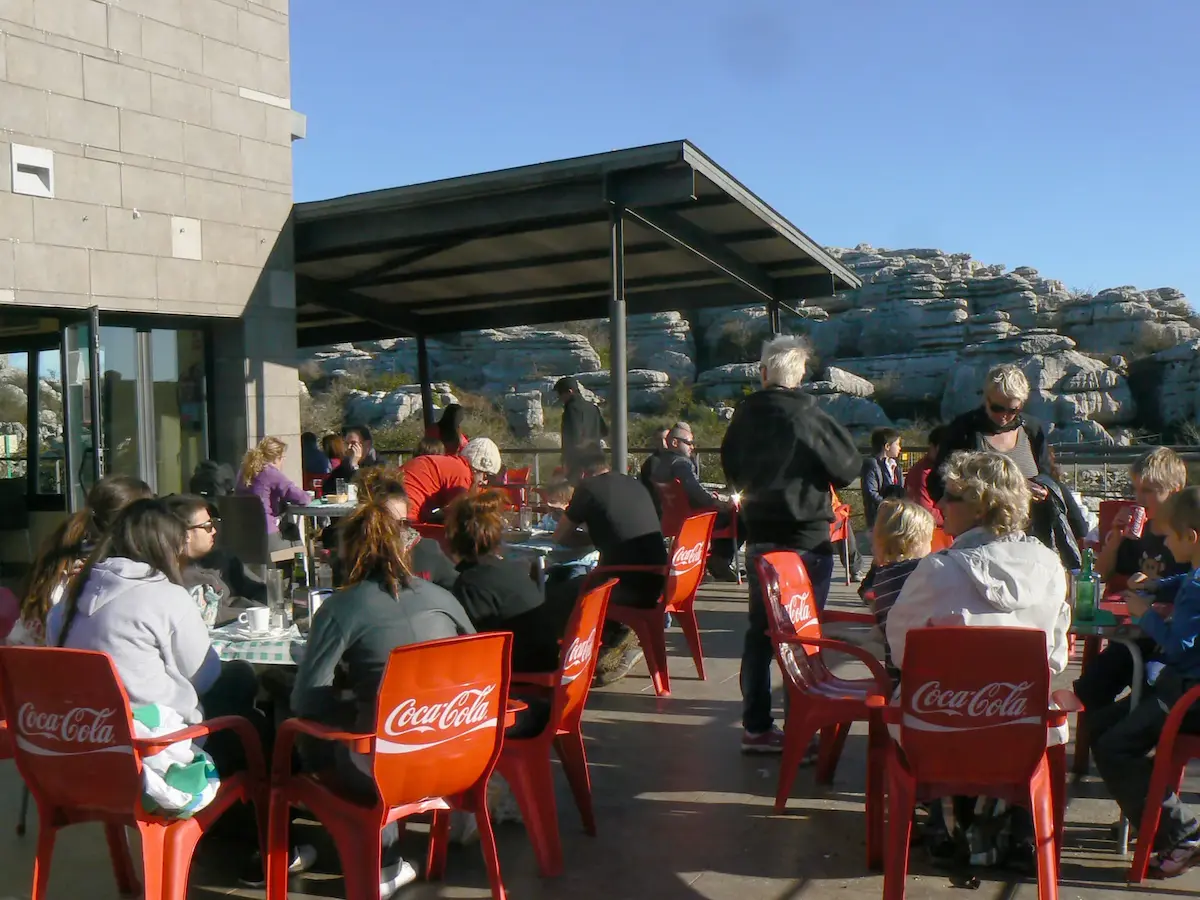
It’s an ideal choice for those looking for an exceptional gastronomic experience in one of the most exclusive natural areas in Antequera.
Las Ventanillas Viewpoint
This viewpoint is one of the most iconic spots in Torcal de Antequera. From here, you can admire a breathtaking panoramic view of the mountains and the strange rock formations that stretch as far as the eye can see. It’s a perfect place to take photos and contemplate the grandeur of nature.
Dolmens of Antequera
The Dolmens of Antequera, including the Tholos del Romeral, and the dolmens of Menga and Viera, were constructed during the Neolithic and the Bronze Age. These dolmens represent an important historical and cultural legacy that reflects the skill and tradition of ancient civilizations.
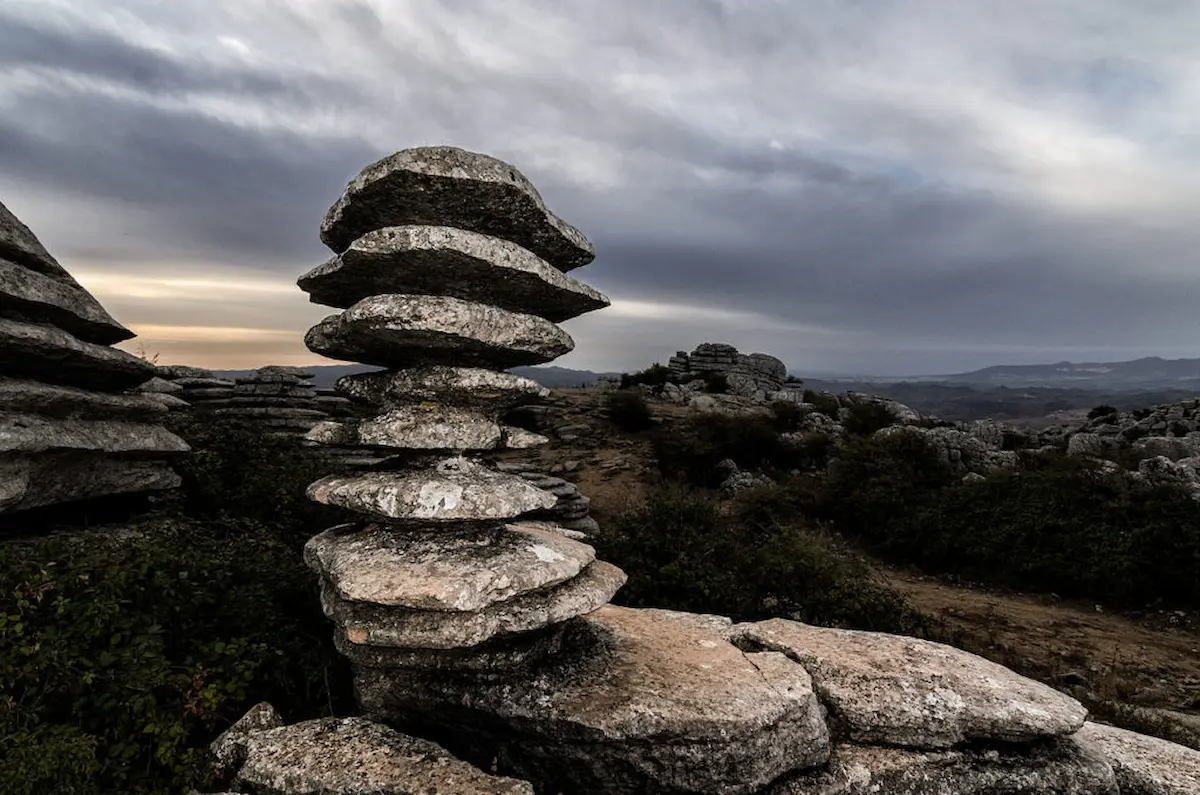
El Torcal Routes
In Torcal de Antequera, there are various hiking routes that allow you to explore and enjoy the beauty of this natural area. These are designed to accommodate different levels of difficulty and duration. Here are some of the most popular ones that can be done with marked and free access.
Green Trail
It’s an easy and accessible hiking route that follows a circular path. The Green Route is ideal for those who want to enjoy panoramic views of Torcal without the need for an extended hike.
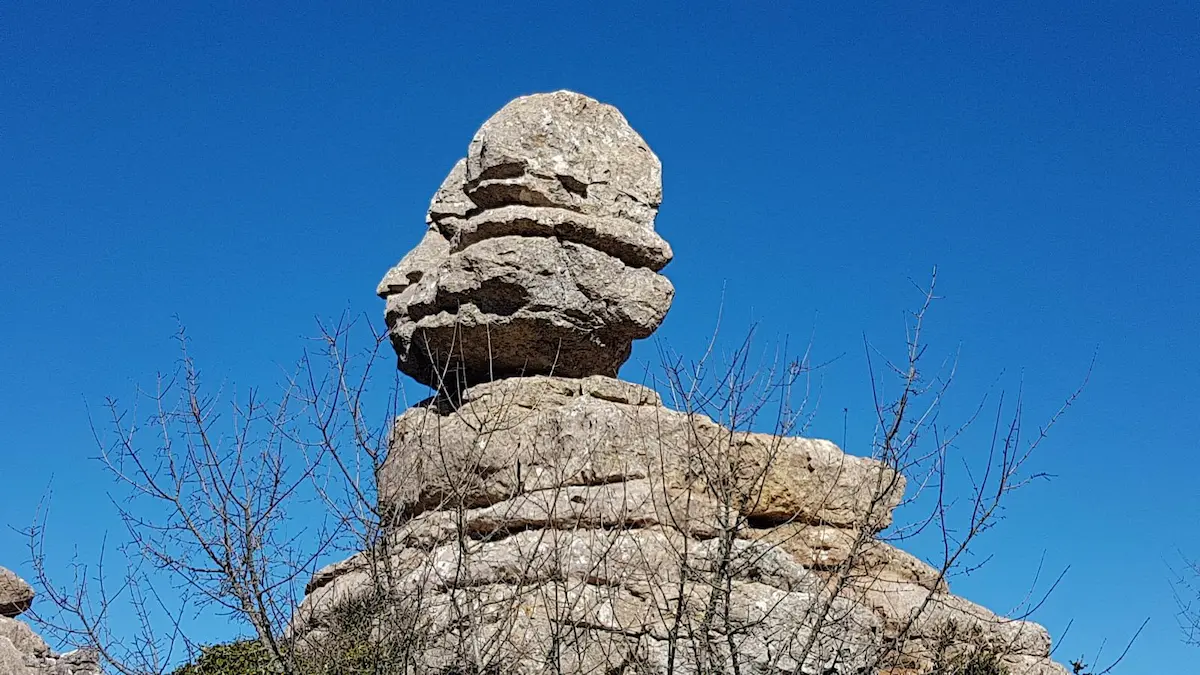
The route starts at the upper parking lot of Torcal de Antequera and descends towards Hoyo de la Burra, where the return journey to the Visitor Center begins. During the hike, you have the opportunity to learn about the morphology of Torcal de Antequera and admire significant rock formations such as the Sphinx, the Indian, and the Watchman.
Interesting Facts:
- Estimated Time: 45 minutes
- Kilometers: 1.5 km
- Elevation Gain: 40 m
- Difficulty: Low
Yellow Trail
The Yellow Trail route crosses the Torcal Alto area and is of moderate difficulty. It will take you through impressive rock formations and fascinating karst landscapes, recommended for those who want to explore different biotopes without straying too far from the Visitor Center.
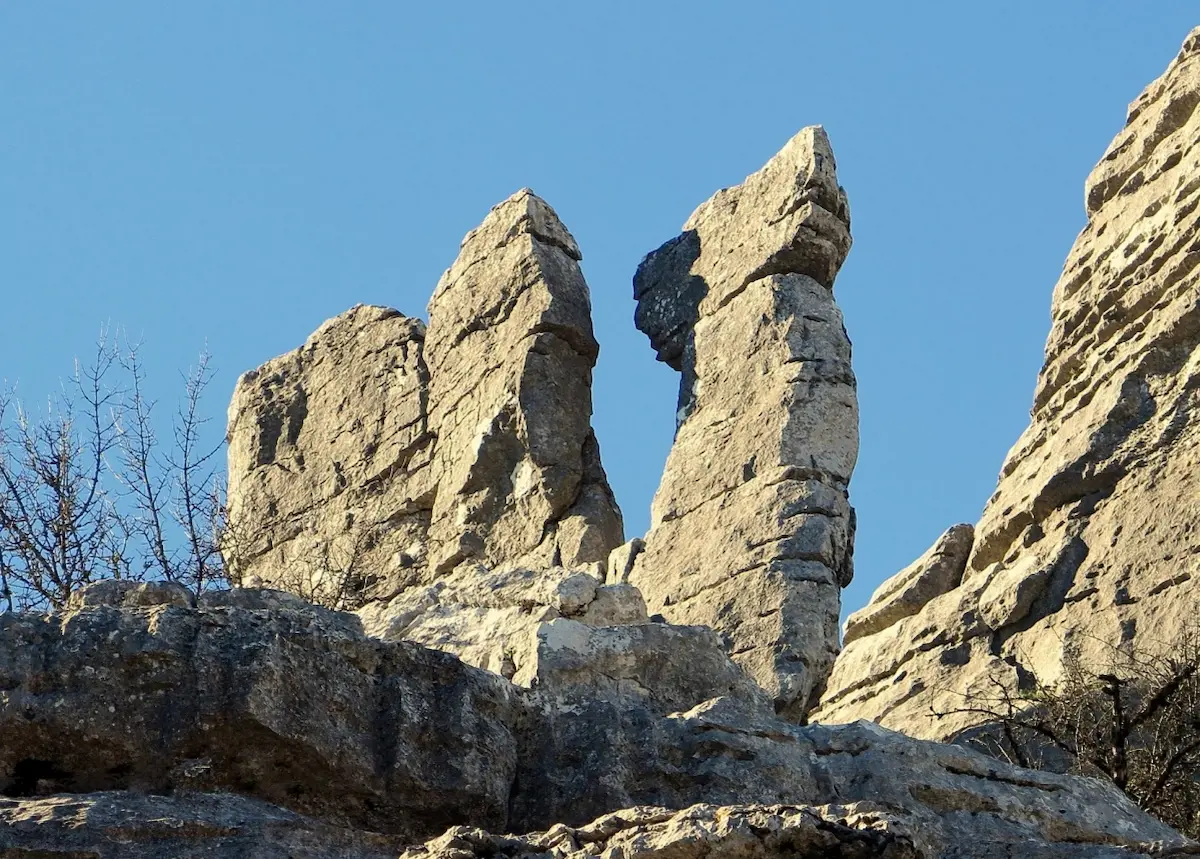
The Yellow Route ventures into areas where shade predominates, resulting in more humid areas with dense vegetation. During the hike, you can appreciate numerous highlights, such as the rock formations known as El Dedo, El Camello, La Jarra, and La Botella.
Interesting Facts:
- Estimated Time: 2 hours
- Kilometers: 3 km
- Elevation Gain: 53 m
- Difficulty: Moderate
Orange Trail
The Orange Trail offers a more comprehensive experience of Torcal, being a route of medium difficulty that will take you through less crowded areas of the natural reserve. This route can be started from two points: the lower or upper parking area, passing through ancient quarries and grazing areas like Hoyo de Gramaeros.
Climb until you reach the Manuel Grajales Viewpoint and the Majada del Fraile. Continue ascending to pass the Puerto de Tinajuela and then descend through the Cañada de Tosaires, which will take you to the Natural Monument of El Tornillo. You’ll be able to explore unique rock formations and enjoy spectacular views.
Points of Interest:
- Estimated Time: 3 hours 30 minutes
- Kilometers: 3.6 km
- Elevation Gain: 263 m
- Difficulty: Moderate
Fauna, Flora, and Weather
Torcal de Antequera hosts rich biodiversity in terms of flora and fauna. Both its animal species and vegetation have adapted to the unique conditions of the karst landscape, rock formations, and the Torcal’s climate.
Fauna
Torcal de Antequera is home to a wide variety of fauna. There are 116 species of vertebrates recorded in the area, including amphibians, reptiles, birds, and mammals. Additionally, there is a great diversity of invertebrates, especially insects, which form the dietary base for many of the vertebrate animals present in the mountains.
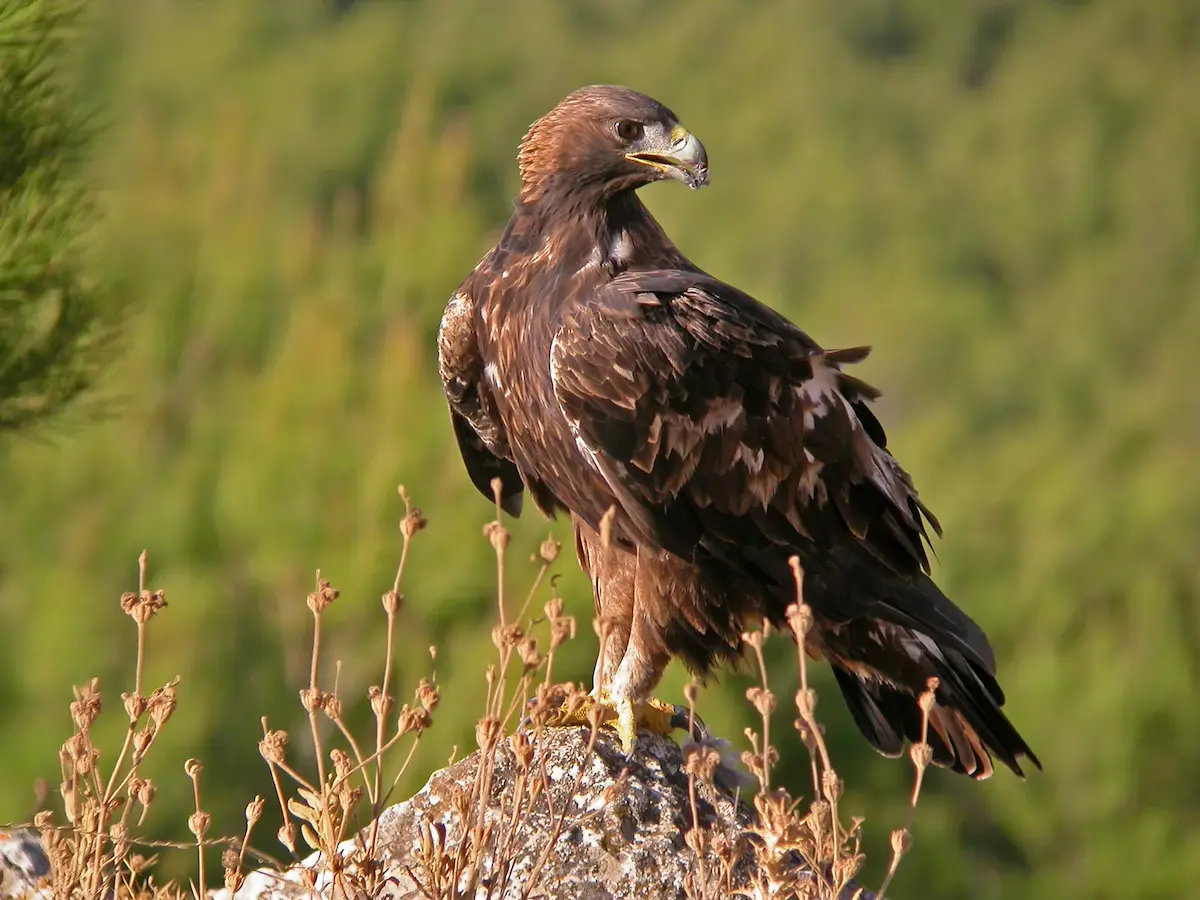
Torcal is known to be an important habitat for several species of raptors such as the golden eagle, Bonelli’s eagle, and peregrine falcon, which find the rock walls an ideal place to nest and hunt. It’s also common to find reptiles like the ocellated lizard and horseshoe whip snake.
The flora and fauna of Torcal are protected, so it’s crucial to respect their habitat and not disturb or harm the species living there.
Flora
The flora of this natural reserve is characterized by rock vegetation. Due to adverse soil conditions and limited water, vegetation in Torcal has adapted to grow on rocks.
You can find mosses, lichens, and various plant species adapted to the cracks and crevices of the rock formations. In lower areas of Torcal where the soil is deeper, you can find holm oaks and wild olive trees, providing shade and shelter for some species.
Weather
The weather in Torcal de Antequera is characterized as Mediterranean, with some peculiarities due to its location in a mountainous environment. During the summer months, temperatures in Torcal can be quite high, reaching maximum values around 30-35°C.
In contrast, winters are usually cool, with minimum temperatures that can drop a few degrees below freezing during the night.
Moreover, moderate to strong winds are common, especially at the tops of the rock formations. These winds can influence the thermal sensation and moisture evaporation.
How to Get to Torcal de Antequera
Torcal is located between Antequera and Villanueva de la Concepción, and there are different routes to access it. We provide detailed information on how to get to Torcal de Antequera, whether by your own vehicle, public transport, or alternative options.
Getting There by Public Transport
Currently, there is no direct public transport service to Torcal de Antequera. However, there are various options available to reach it if you don’t have your own vehicle or a rental car, such as taking a taxi from Antequera or booking a guided tour that includes transportation.
Companies like Visita Antequera offer such services. These alternatives will allow you to reach Torcal de Antequera without needing your own vehicle, making your visit easier and ensuring comfortable and safe transportation.
Getting There by Car
To reach the Torcal de Antequera Natural Reserve, there are two main access points by car. The recommended one is through the city of Antequera, following the signs to “Villanueva de la Concepción” and “El Torcal.” Take the A-7075 road and continue to Kilometer 42, where you’ll find the turnoff to the Torcal Alto Visitor Center.
Another option is from the Malaga coast, taking the A-45 towards Córdoba-Sevilla-Granada. Take the exit towards Casabermeja and then continue on A-7075 towards Villanueva de la Concepción. Once in this town, continue towards Antequera until you find the turnoff to the Torcal Alto Visitor Center.
Map of Torcal de Antequera
This map will guide you through the trails and highlights of this unique natural reserve. You’ll discover impressive rock formations, panoramic viewpoints, and hiking routes. Our map with highlights will help you make the most of your visit to Torcal de Antequera.


